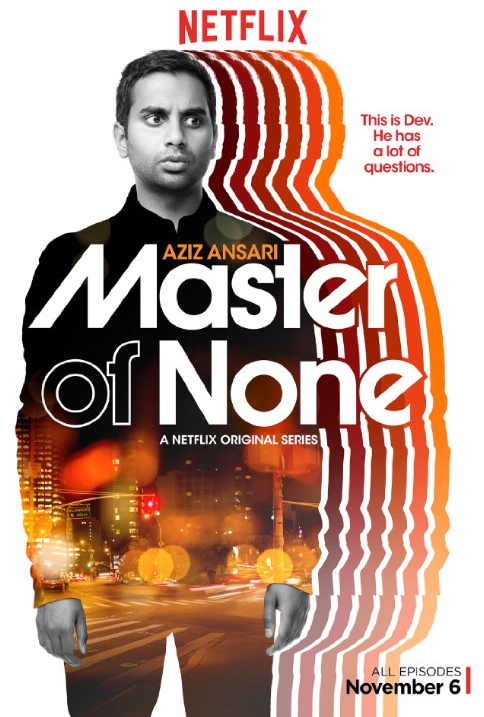why netflix’s master of none should be compulsory viewing for male feminists
Debuting to critical acclaim at the end of last year, Netflix has recently announced that Master of None – the comedy with a delightful penchant for bluntly calling out inequality – will be returning for a second season.
Created by Aziz Ansari (Parks and Recreation) and Alan Yang (a producer on Parks), Master of None in many ways follows a familiar formula. Dev (Ansari) is a struggling actor, and the show follows him as he negotiates his career and love-life in New York City. Like Lena Dunham’s Girls before it, Master of None offers a comedic and individual take on serious topics. Master of None effortlessly weaves awkward tales of modern romance with reflections on issues like societal intolerance for filmic and cultural diversity, and gender discrimination. However, unlike Girls, Master of None has a male protagonist, introducing a new dimension to feminism on TV.
There is often controversy surrounding the term feminist, particularly when it is applied to men. In her 2014 speech for the ongoing U.N. campaign ‘He for She,’ Emma Watson addressed the common misconception that feminism can be equated with misandry, observing that ‘fighting for women’s rights has too often become synonymous with man-hating.’ Rejecting this assumption, Watson reiterated the correct definition of feminism: ‘The belief that men and women should have equal rights and opportunities. It is the theory of the political, economic and social equality of the sexes.’ He for She is a continuing effort by the U.N. to urge men, as well as women, to take ownership of global gender inequality.
In recent weeks Watson was again targeted by online trolls after tweeting a pro-equality quote from Alan Rickman, in memory of the late actor. The U.N. ambassador was accused of exploiting the actor’s death, yet Watson’s tweet simply relayed Rickman’s own words: ‘There is nothing wrong with a man being a feminist – I think it is to our mutual advantage.’
Aziz Ansari is a self-professed feminist. This comes through clearly in his stand-up, and in the first season of Master of None. While a second season is not due to air until 2017, the substantial first season demands both consideration and rewatching.
Dev faces instances of everyday prejudice in his career and love life with frank, intelligent humour. In a particularly memorable season one moment, Dev calls out a TV executive for not wanting to cast two Indian guys – ‘there can’t be two’ – in ‘Indians on TV.’ He recounts all the times that white guys were cast for Indian roles. The episode ‘Old People’ provides a poignant insight into how society views the older generation. There is also a touching, yet funny-as-ever episode entitled ‘Parents’, in which Dev begins to fully appreciate the sacrifices his immigrant parents – played by Ansari’s real-life parents – have made for him.
Perhaps the most memorable moment for me was the episode ‘Ladies and Gentlemen’, which exhibits the most blatantly feminist commentary of the whole season. Without too many spoilers, this episode juxtaposes Dev’s experiences as a man at a bar with his female colleague’s markedly different experience at the same bar. The woman is stalked home by a strange man from the bar as sinister music plays, providing a stark contrast to Dev and friend Arnold’s (Eric Wareheim) jaunt home, scored with a cheerful, whistling tune. The scene successfully emphasises the different realities of men and women, highlighting the alarming way in which women often do not feel safe in the same spaces or circumstances as men. Despite being a comedy, watching a woman desperately seek the safety of her home only to have to eventually call 911 anyway reminds you that Master of None is not afraid to directly confront its subject – and its audience. The episode is peppered with Dev’s observations about the gender pay gap, and how television casting of women places excessive, undue emphasis on appearance. Moreover, the episode includes Rachel and Denise (Noël Wells; Lena Waithe) educating Dev on the aggressively sexist nature of social media trolls, their experiences with ‘creepy dudes,’ as well as a surprisingly articulate definition of feminism from Arnold. The episode also offers a great starting point for men when Arnold asks, ‘What can two gentlemen like us do to help?’ Simply, as Rachel puts it, ‘I don’t know … don’t do that stuff?’
However, rather than falling into a trap of “mansplaining” gender inequality, the men of Master of None openly admit that they often have a lot to learn about the nuanced spectrum of female experience. Shout out to Rachel for nailing the ‘subtle little things’ that Dev is often unaware of, which constitute everyday sexism. As Rachel states, to treat women as if they are ‘crazy’ when they raise such subtleties, like being the only people at a table to not be acknowledged or greeted by a man, is to ‘deny our perception of the world.’
There is still much work to be done in regards to gender equality. Threats of physical and sexual violence, education discrepancies, wage gaps, and unrealistic representations of women in popular culture are merely a few obstacles facing women globally. The ubiquity of such prejudice is an issue for both genders, making TV shows like Master of None, which includes both a feminist stance and a male protagonist, even more refreshing.


